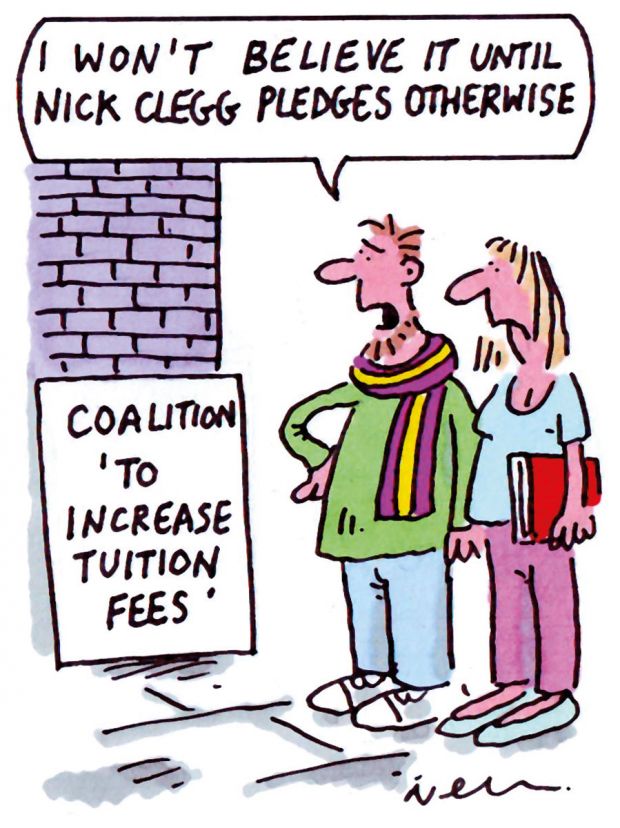
- Higher education returned to the general election campaign in the final days before voting. Labour’s promise to cut tuition fees to £6,000 was not one of the promises etched in the party’s 8ft-high “pledge stone” by Ed Miliband’s masons, but he still doubled down on the policy with a last-minute poster campaign on university campuses. Labour claimed that the Tories’ “extreme plans” would require tuition fees to rise to £11,500 a year to offset a £1.5 billion cut to the annual higher education budget – with Liberal Democrats again helping to make it happen. Former Conservative leader William Hague accused Labour of putting out “scare stories” – but also explicitly refused to rule out raising fees.
- A University of Sussex academic has criticised the “totally inappropriate sexist comments” of a peer reviewer who stated that her research paper could be improved by the addition of a male co-author. Fiona Ingleby, research fellow in evolution, behaviour and environment, told Times Higher Education of her “shock and disbelief” at the “sexist” and “patronising” comments made about a manuscript submitted to the journal Plos One. Written with Megan Head, a postdoctoral researcher at the Australian National University, it examined the progression of PhD graduates to postdoctoral positions in life sciences. The reviewer felt that the work would benefit from “one or two male biologists” and questioned whether female scientists had the right traits for success. A Plos One spokesman said the journal regretted “the tone, spirit and content” of the review.
- Having sparked protest last month by cancelling a conference on the Charlie Hebdo murders, Queen’s University Belfast has made a U-turn. The event in June was called off two weeks ago because, the organisers said, of security and reputation concerns expressed by the vice-chancellor. But it is now back on after Queen’s announced on 1 May that a “comprehensive risk assessment” had been conducted. That hastily completed exercise should not be confused with the previously undertaken “general risk assessment”, which had not consulted with police – an omission the university cited as the reason for the cancellation.
- Just when it seemed that Nigel Piercy, the dean of Swansea University’s business school, had learned how to keep his foot out of his mouth, he’s back in the headlines over what the Western Mail called a “remarkable personal attack” on trade unionists. In a blog posting, Professor Piercy says that among those “claiming the right to censor and veto” academics’ pronouncements are “unpleasant and grubby little people, who purport to represent others because they have persuaded a tiny number of people to elect them to office in trades unions and the like”. Such “creepy little people” are “usually distinguished only by their sad haircuts, grubby, chewed fingernails and failed careers”. Another characteristic is “straggly beards”, “half-way between designer stubble and a real beard” and “probably indicative of a hormone deficiency”. Professor Piercy is often exercised by his opponents’ barnets. Last year he told academics that the school was “not a rest home for refugees from the 1960s, with their ponytails and tie-dyed T-shirts”. A Swansea spokeswoman said that Professor Piercy had the “freedom” to express his “personal views”.
- The students’ union at Goldsmiths, University of London, has been criticised for an apparent reversal on whether men and white people could attend an event specifically for black and minority ethnic women and non-binary students (who do not identify as male or female), the Huffington Post reported on 1 May. The University College London Union said that it was disappointed that the Goldsmiths union had apologised for remarks by its welfare and diversity officer, Bahar Mustafa, who asked men and white people to steer clear of a BME Network event. “Self-defining spaces are so important because the reality is it is not possible to have the discussions that need to be had with your oppressors in the room – even if they are not saying anything,” a UCLU statement said. Suffice to say, the stance did not dampen the row online: one Twitter user said it left them “embarrassed” to be a UCL graduate.
